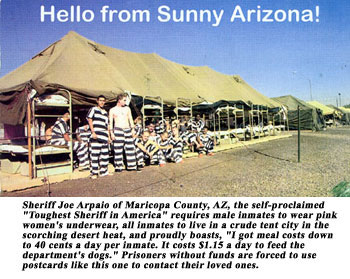That famous definition of a cynic as someone who knows the price of everything and the value of nothing has come to define this present moment of American politics.
–Bill Moyers and Michael Winship
I know that I criticize you [Bernie Goldberg] and Fox News a lot, but only because you’re truly a terrible, cynical, disingenuous news organization.
–Jon Stewart
To say that force may sometimes be necessary is not a call to cynicism–it is a recognition of history, the imperfections of man and the limits of reason.
–Barack Obama
This is an old argument, one that The Nation’s Benjamin DeMott examined in “Seduced by civility,” a 1996 essay subtitled, “Political manners and the crisis of democratic values.” The line back then, which hasn’t changed much in fourteen years, was that progressive politics was caught in a stranglehold of cynicism, meanness and counterproductive finger-pointing.
–Katrina vanden Heuvel
* * *
When I was in tenth grade, I had a habit of making disparaging comments about politicians in my world history class. The teacher got exasperated with me one day and said, “Oh Chuck, you’re just a cynic.” Other kids started calling me a cynic as well. It seemed to make me a little bit dangerous, and for a few weeks I swaggered around with my new identity until it occurred to me that I had no idea what a cynic actually was. So I looked it up in the dictionary and it said, as I recall, “a person who attributes base motives to others.”
That described me accurately enough, but there was also a second definition, something to the effect of, “an adherent of the Cynic philosophy.”
“Wow,” I thought. “There’s a whole philosophy of attributing base motives to others? Why have I not heard of this?”
I charged off to the philosophy section of the library, looked for “cynic” in every index, and discovered a man named Diogenes, who lived in Greece from about 404 B.C.E. to 323 B.C.E. All the anecdotes about his life as the most famous Cynic, all the translations of his sayings, all the assumptions about his meaning were wildly contradictory from source to source–and still are–but somehow I knew I had discovered one of the great human beings ever. I now suspect that all the contradictions occurred because so many of the writers were fans of Plato and Socrates, the two patron saints of bad college professors everywhere, and Diogenes made a point of humiliating them in ancient Athens. A good rule of academic thumb: If your teacher is walking up and down the aisle trying to engage you in Socratic dialogue, the next hour is going to suck the mop.
(The best text I have found on Diogenes and his philosophical descendants is The Cynics: The Cynic Movement in Antiquity and Its Legacy, edited by R. Bracht Branham and Marie-Odile Goulet-Caze.)
Anyway, Diogenes came from a town called Sinope. His father was some kind of banker, and Diogenes started his career as a cynic by either defacing or debasing money. That’s the first big contradiction in different sources. Debasing money means adding base metal to precious metal for the purpose of creating more coins than you could get just from the precious metal. It is an act of greed. Since Diogenes spent the rest of his life with almost no possessions, did nothing for money except beg and was conceded to be ruthlessly honest even by his enemies, I’m guessing that he wasn’t debasing coins.
No, almost certainly, he was defacing coins. There is even archeological evidence for this around Sinope, where coins with the face chiseled off have been discovered. The people of Sinope and, one must assume, Diogenes’ father were outraged, and Diogenes went into exile, eventually taking up residence in an old wine jar outside of Athens.
It is worth digressing at this point to consider one of Diogenes’ most famous contemporaries, namely Buddha, whose life was following almost the exact same plot line in northern India. A prince, Buddha was living a life of luxury when he had some chance encounters with old age, sickness and death on a hunting trip. He had a sudden realization that he didn’t understand anything and had to leave the the big, comfortable, insulating lie that was the royal compound, so he abandoned his wife and child and went to live in the forest and eat dirt. After six years, he decided that extreme asceticism wasn’t the way to live either, and he sat under the Bodhi Tree until he had his moment of enlightenment.
Diogenes went to the marketplace in downtown Athens and jerked off.


